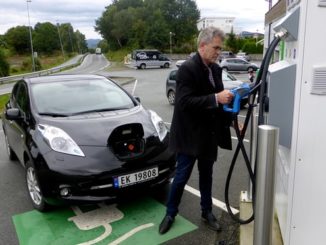
If you’re thinking of buying an all-electric or hybrid car, here are a few things to consider. USA TODAY
Corrections & Clarifications: A quote on “range anxiety” in the original version of this story was attributed to the wrong executive at TE Connectivity. It should have been attributed to Steven Merkt, president of Transportation Solutions for TE Connectivity.
With automakers hoping to put tens of thousands of new electric vehicles on American roads this year, the nation’s nascent charging system needs to grow up fast.
Tesla is gearing up to deliver thousands of its new mass-market Model 3 electric cars per week. General Motors is already selling thousands of its Bolt electric cars per month; Nissan is poised to begin sales of its redesigned Leaf electric car at a similar rate; and other battery-operated cars are on the way.
But for drivers who cherish the American ideal of a spontaneous cross-country road trip, charging these vehicles will be a challenge. Options to replenish EV batteries on trips are few and far between for millions of Americans.
Despite efforts to build charging stations by Tesla, Volkswagen, the U.S. government and several start-ups, wide swaths of the nation are essentially no-go territory for electric vehicles.
For example, winding from the suburbs of Salt Lake City to one of America’s most popular vacation destinations, Las Vegas, is not a problem with a gasoline car. But it’s a challenge with an electric vehicle. Charging options are limited until you get to the Cedar City, Utah, area — that is, if you don’t run out of charge before then.
Many Americans worry that they’ll be left stranded in an electric car without enough battery range to get to a charging station.
“They have range anxiety,” said Steven Merkt, president of transportation solutions for TE Connectivity. “Is the charging infrastructure appropriate and fast enough for me to be able to make the kind of trips that I like to make with a vehicle?”
He thinks the anxiety will linger for a while, particularly since the U.S. is so large. “You have people that are used to taking long trips.”
Experts agree there aren’t yet enough public charging stations, which could temporarily limit demand for electric cars.
Ironically, however, those stations might not be needed forever. With self-driving, ride-sharing vehicles expected to arrive within the next half-decade in major cities, many experts believe charging will be left to professional fleet managers — not individual drivers.
Taken together, the challenges show how difficult it is to revolutionize how a nation fills up.
Automakers have sold more than 727,000 plug-in hybrid or battery-powered cars in the U.S. since 2010, according to the Electric Drive Transportation Association. But the Edison Foundation Institute for Electric Innovation projects that annual sales will soar to 1.2 million by 2025, representing about 7% of total vehicle sales.
There are only about 16,300 publicly accessible, standard charging stations today with an average of three outlets each, according to the U.S. Department of Energy’s Alternative Fuels Data Center. Those stations take a few hours to charge up a typical electric car.
But the nation will need about 100,000 to 200,000 charging stations to fulfill future demand, estimates Michael Berube, director of the Department of Energy’s Vehicle Technologies Office.
That will likely require significant investments by automakers, state and federal transit authorities and local governments. And it needs to include several thousand very fast locations, Berube said.
“It’s not completely out of reach,” Berube said. “It’s definitely possible and feasible to see that level.”
Of the total, about 2,200 stations are classified as very fast direct-current stations with 5,900 outlets. Those locations charge electric cars at a faster rate, approaching 30 minutes for a full charge in some cases. For slower chargers, it can take several hours or even all night to get a full charge.
Whether fast or slow, chargers will be as vital to the American road trip as caffeine and mix tapes.
Visits: 4





Teh electric vehicle is a new energy.